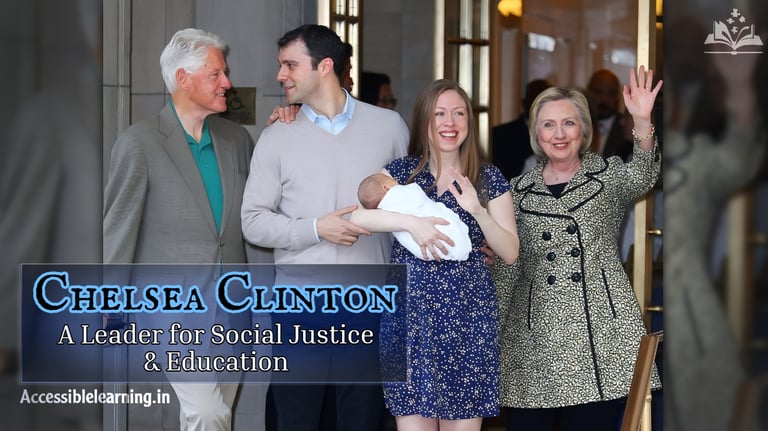
Hillary Clinton: Breaking Barriers in American Politics?
Hillary Clinton: A comprehensive look at the life and legacy of one of the most influential women in modern American politics. Explore her journey from a young advocate for children’s rights to a trailblazing leader, U.S. Secretary of State, and the first woman nominated for U.S. president by a major party.
BIOGRAPHYPOLITICAL JOURNEYUSAWEALTHY FAMILYENTREPRENEUR/BUSINESSMAN
Sachin K Chaurasiya
12/31/20245 min read


Hillary Rodham Clinton is one of the most prominent and influential figures in modern American politics. From her early days as a young attorney advocating for children’s rights to becoming the first woman nominated for president by a major political party, Clinton’s career has been marked by resilience, determination, and a commitment to public service. Her life story is a testament to breaking barriers and navigating the complexities of public life.
Early Life & Education!
Born on October 26, 1947, in Chicago, Illinois, Hillary Diane Rodham grew up in a middle-class household in the suburb of Park Ridge. Her father, Hugh Rodham, was a successful small business owner, while her mother, Dorothy Howell Rodham, encouraged her intellectual curiosity and ambition. Hillary was an exceptional student, excelling in academics and extracurricular activities, and developed a strong sense of justice early on.
Clinton attended Wellesley College, where she majored in political science and became active in student government. Her commencement speech in 1969—a rare honor for a student speaker—received national attention and showcased her passion for social justice and public policy. She then pursued a law degree at Yale Law School, where she met her future husband, Bill Clinton.
Early Career and Advocacy?
After graduating from Yale in 1973, Hillary worked as a staff attorney for the Children’s Defense Fund, advocating for policies to improve the welfare of disadvantaged children. Her work reflected a lifelong commitment to social justice and equity. Later, she joined the impeachment inquiry staff during the Watergate scandal, where her legal acumen was widely recognized.
In 1975, Hillary married Bill Clinton and moved to Arkansas, where she began teaching law at the University of Arkansas and practicing law. She quickly made a name for herself as a formidable attorney, becoming the first woman partner at the Rose Law Firm. Her professional success did not detract from her dedication to public service—she chaired numerous organizations and initiatives aimed at improving education and healthcare in the state.
First Lady of Arkansas and the United States?
As First Lady of Arkansas from 1979 to 1981 and again from 1983 to 1992, Hillary played a significant role in shaping state policy. She led efforts to reform Arkansas’s education system, which earned her national recognition. Her advocacy for children’s health and welfare further cemented her reputation as a policy-focused and results-oriented leader.
In 1993, when Bill Clinton became the 42nd President of the United States, Hillary redefined the role of First Lady. She took an active role in policy-making, leading the Task Force on National Health Care Reform. Although the initiative ultimately failed, her effort demonstrated her willingness to tackle complex and politically sensitive issues. During her tenure, she also championed women’s rights globally, famously declaring at the 1995 Beijing Women’s Conference that “Human rights are women’s rights, and women’s rights are human rights.”
Her role as First Lady also included significant advocacy for family values, early childhood education, and increased access to healthcare. She supported the State Children’s Health Insurance Program (SCHIP), which provided health insurance to millions of children from low-income families.
Senator from New York!
In 2000, Hillary Clinton made history by becoming the first First Lady to win elected office, securing a seat in the U.S. Senate from New York. Her tenure as senator was marked by her focus on healthcare, education, and national security. She worked across party lines in the aftermath of the September 11 attacks to secure funding for rebuilding efforts in New York and improve emergency response systems.
She served on several Senate committees, including the Armed Services Committee, where she advocated for the well-being of military personnel and veterans. Clinton’s pragmatic approach and dedication to her constituents earned her bipartisan respect, despite facing significant scrutiny due to her national profile.


Presidential Campaigns and Secretary of State
Hillary Clinton’s ambition to lead the nation culminated in her historic run for the presidency in 2008. Although she lost the Democratic nomination to Barack Obama, she made a significant impact, receiving more primary votes than any other female candidate in U.S. history at that time. Following Obama’s victory, she was appointed Secretary of State, serving from 2009 to 2013.
As Secretary of State, Clinton navigated complex international challenges, including the Arab Spring, U.S.-Russia relations, and the raid that killed Osama bin Laden. Her tenure was marked by her advocacy for “smart power,” emphasizing diplomacy and development alongside military strength. She played a central role in the U.S. response to global crises, including sanctions against Iran and the negotiation of the New START treaty with Russia to reduce nuclear weapons. However, it was not without controversy, as her handling of the 2012 Benghazi attack and her use of a private email server became focal points of criticism.
In 2016, Clinton made history again by becoming the first woman to be nominated for president by a major U.S. political party. Running against Donald Trump, her campaign emphasized unity, inclusivity, and progressive policies, including healthcare reform, climate change action, and gender equality. Although she won the popular vote by nearly three million votes, she lost the Electoral College, a result that sparked intense debates about the U.S. electoral system and the role of misinformation in modern campaigns.
Post-Political Career and Legacy!
Since her 2016 loss, Hillary Clinton has remained a vocal advocate for democracy, women’s rights, and social justice. She has written several books, including her memoir, What Happened, which reflects on her presidential campaign and the challenges of modern politics. Clinton has also co-authored The Book of Gutsy Women with her daughter, Chelsea Clinton, celebrating the stories of trailblazing women throughout history.
Through the Clinton Foundation, she continues to work on global initiatives related to health, education, and economic development. Her foundation has focused on combating climate change, reducing childhood obesity, and providing access to life-saving HIV/AIDS medications in developing countries.
In addition to her work through the foundation, Clinton remains active in public discourse, frequently addressing issues such as voting rights, the role of women in leadership, and combating disinformation. Her podcast, You and Me Both, provides a platform for discussing contemporary issues with thought leaders and advocates from diverse fields.
Clinton’s legacy is multifaceted. She is celebrated as a trailblazer who shattered glass ceilings and opened doors for women in politics. Yet she remains a polarizing figure, often at the center of partisan debates. Regardless of one’s political views, her impact on American society and global politics is undeniable.
Awards and Recognitions
Over the years, Hillary Clinton has received numerous accolades and awards recognizing her contributions to public service, human rights, and global diplomacy. These include the Eleanor Roosevelt Award for Human Rights, the Champions of Global Change Award, and several honorary degrees from prestigious institutions. In 2022, she was inducted into the National Women’s Hall of Fame, cementing her legacy as a transformative figure in American history.


Hillary Clinton’s life and career embody the complexities of leadership in the modern era. Her relentless pursuit of justice, dedication to public service, and ability to navigate challenges have made her an enduring figure in American history. As a role model and advocate, Clinton’s influence extends far beyond her political achievements, inspiring future generations to strive for equality, opportunity, and progress.
Subscribe to our newsletter
All © Copyright reserved by Accessible-Learning
| Terms & Conditions
Knowledge is power. Learn with Us. 📚


